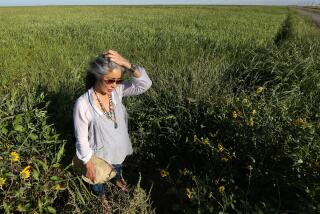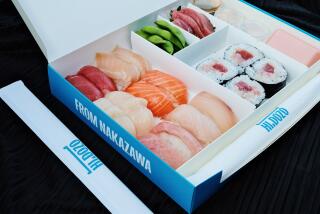Maine Firm Hopes to Catch Business by Using Nets to Grow Seaweed : Food: American entrepreneur has designs on sushi bar staple traditionally imported from the Far East.
EASTPORT, Me. — Swim aside, sardines. Stand back, salmon. Seaweed is moving in as this busy little fishing burg’s latest treat from the deep.
A new company is growing the Japanese variety of nori--a staple of sushi bars--in waters better known for salmon aquaculture and the herring that used to supply a number of sardine canning plants.
Coastal Plantations International Inc. claims to be the only seaweed farming company in North America. Its president and chief executive officer, Ira Levine, says most of America’s nori comes from Japan, China and Korea, where it is grown in abundance and considered an everyday food.
Growing the plants on 6-by-60-foot nets suspended in the cold waters off the nation’s easternmost city, Coastal Plantations hopes to produce 1% of the nori consumed in the United States this year.
Within three years, Levine hopes to capture 10% of the domestic market--that is, if Americans take to eating the nutrient-rich seaweed with soup and salads and using it to flavor hamburgers and make tea.
The cultivated seaweed grows into what resembles a dark red-brown, leafy lettuce. It’s grown up to 10 inches before it’s clipped and taken to a factory where the clippings are chopped and dried to form 8-by-8-inch sheets. The worldwide market is estimated at 12 billion to 15 billion sheets.
Those who prefer nori by itself can break off pieces of the dry, paper-thin sheets. Place a piece on your tongue and it melts in your mouth.
Levine, who describes the taste as “nutty, roasty, smoky,” said nori has been known for its medicinal qualities since 3000 BC.
It is known to lower cholesterol, and studies are being done on its ability to cure stomach cancer and ulcers, said Levine, who has a doctorate in seaweed farming and teaches at the University of Southern Maine.
An earlier attempt to farm nori, aided by University of Washington researchers, failed in the 1980s because of a lack of aquaculture lease sites on the West Coast.
Levine, then an aquaculture consultant, was looking for an opportunity to start his own business. He found ample seaweed farming grounds off Maine’s rocky coast and had the advantage of other Americans’ experience growing the plant, whose scientific name is Porphyra yezoensis.
Last fall, Coastal Plantations reaped its first harvest in its second year in the business--only a third as long as it took the Western growers to reach that point.
“Our learning curve is steep, but not as steep as other people’s,” said Steve Crawford, who oversees operations at the company’s Eastport plant, a former sardine cannery jutting over Cobscook Bay.
Crawford, who has been in fish aquaculture for 23 years and once ran the largest catfish farm in Oklahoma, had obtained aquaculture permits and had set up a processing plant by the time Levine came on the scene and Coastal Plantations was formed in 1992.
Coastal Plantations has leases to grow nori on 80 acres of the bay, parts of which resemble a floating checkerboard where salmon and rainbow trout are also grown for commercial use.
Maine’s growing season runs from June to December, when the water matches the temperatures of Tokyo Bay where Japanese grow nori from January to June.
Levine hopes to be an active player in the local sea-farming industry that has been filling the vacuum left by the sardine industry.
For a century, sardine canning, which has nearly disappeared in the last few decades, was the major industry in the town of nearly 2,000 people.
Levine’s company has applied for nori-cultivation leases on 140 acres of water off Eastport where others could grow nori for Coastal Plantations.
The salmon farmers, according to Levine, are likely prospects. The two products, he says, complement each other, since nori thrives on salmon excrement. By placing nori plantations around salmon aquaculture sites, salmon farmers would cleanse the water of salmon waste while nourishing the nori.
“This is not just a seaweed company,” said Levine, whose company will work to genetically improve the four local species of nori with hopes of making them more palatable and commercially viable.
Nori’s world market price is fixed regularly on the basis of quality. At the health food store or sushi bar, prices for the poorest quality nori are 19 cents a sheet; the best sheets can cost $10 each. Coastal Plantations’ midrange nori is running 45 to 60 cents a sheet.
The company produced about 100,000 “sheets” in 1993. “This year, we will make 3 million sheets,” Crawford said.
More to Read
Inside the business of entertainment
The Wide Shot brings you news, analysis and insights on everything from streaming wars to production — and what it all means for the future.
You may occasionally receive promotional content from the Los Angeles Times.










